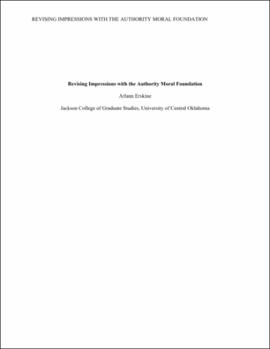| dc.contributor.advisor | Randell, J. Adam | |
| dc.contributor.author | Erskine, Arlann | |
| dc.date.accessioned | 2021-12-07T21:35:19Z | |
| dc.date.available | 2021-12-07T21:35:19Z | |
| dc.date.issued | 2021 | |
| dc.identifier.other | (AlmaMMSId)9982799647602196 | |
| dc.identifier.uri | https://hdl.handle.net/11244/331412 | |
| dc.description.abstract | Past research argues that judgments of morality supersede warmth or competence when forming
impressions, and that some people will revise an impression based on highly diagnostic moral
information. Moral Foundations Theory proposes that people will differ in the endorsement of
five moral domains (Care, Fairness, Loyalty, Authority, and Sanctity). Impression research has
been mostly focused on moral situations that would categorically fall into the endorsement of
Care and Fairness (Individualizing Foundations). This would be the first experiment to isolate a
Binding Foundation in impression research. I hypothesize participants would update their
impressions to a greater degree when given new authority-violation information as their
endorsement of the Authority Foundation (a Binding Foundation) grows. In this experiment, I
used qualitative analysis through a Qualtrics survey to gather data. I used Individuating
Foundations information to guide participants to create a positive moral first impression of a
target. Then, I attempted to provoke participants to update their impressions by presenting some
with new information concerning a violation of the Authority Foundation (vs. neutral
information). A hierarchical regression revealed my hypothesis was partially supported as there
was a significant main effect between the Negative Authority Condition and the participants’
final impression. However, regardless of their measured Authority endorsement, participants
rated the target more negatively after reading the target’s authority-violating acts. It’s possible
the results imply the use of the Authority Foundation could cause a negative impression from
authority-violation information. In future studies, implicit measures should be added to
determine moral impressions. The current experiment is a first step towards understanding how
specific moral considerations affect and change impressions and further research could expand
current arguments about Moral Foundations Theory and impression research. | en_US |
| dc.rights | All rights reserved by the author, who has granted UCO Chambers Library the non-exclusive right to share this material in its online repositories. Contact UCO Chambers Library's Digital Initiatives Working Group at diwg@uco.edu for the permission policy on the use, reproduction or distribution of this material. | |
| dc.subject.lcsh | Judgment | |
| dc.subject.lcsh | Ethics | |
| dc.subject.lcsh | Psychological aspects | |
| dc.subject.lcsh | Social psychology | |
| dc.title | Revising impressions with the authority moral foundation | en_US |
| dc.type | Academic theses | |
| dc.contributor.committeeMember | Limke-McLean, Alicia | |
| dc.contributor.committeeMember | McMillan, Sean | |
| dc.thesis.degree | M.A., Experimental Psychology | |
| dc.subject.keywords | Authority | |
| dc.subject.keywords | Explicit | |
| dc.subject.keywords | Foundations | |
| dc.subject.keywords | Impression | |
| dc.subject.keywords | Moral | |
| dc.subject.keywords | Revising | |
| dc.identifier.oclc | (OCoLC)1288703432 | |
| thesis.degree.grantor | Jackson College of Graduate Studies | |
